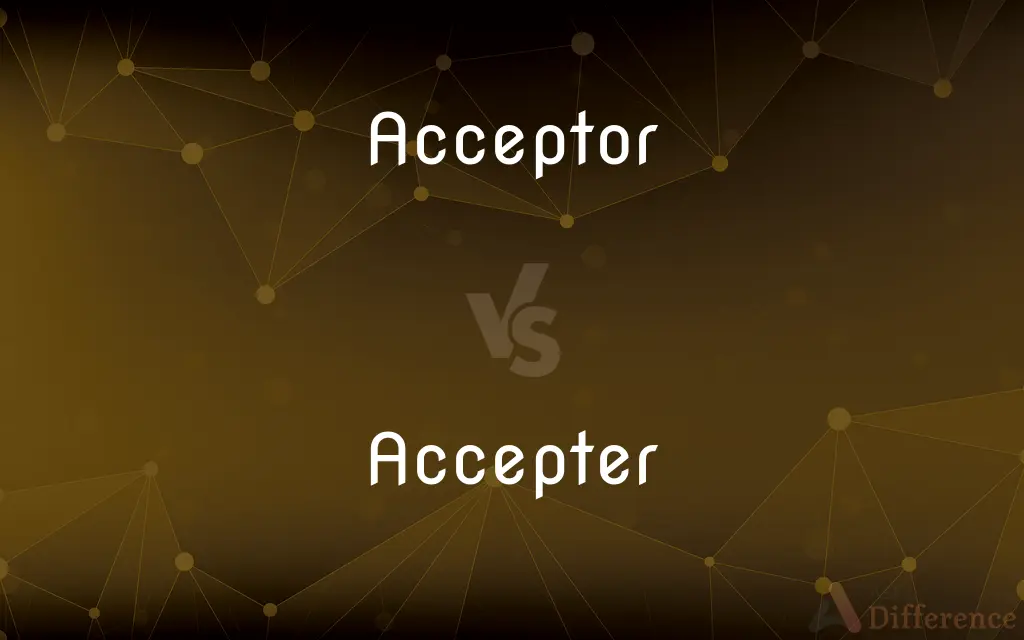Acceptor vs. Accepter — What's the Difference?
By Tayyaba Rehman & Fiza Rafique — Updated on April 5, 2024
An acceptor is a term often used in chemistry and electronics, indicating a reactant or component that receives electrons, while an accepter broadly refers to someone or something that accepts something in general contexts.

Difference Between Acceptor and Accepter
Table of Contents
ADVERTISEMENT
Key Differences
An acceptor is a specialized term, primarily used in fields like chemistry and electronics, where it describes entities that receive electrons or holes. These acceptors play crucial roles in determining the properties of materials, especially in semiconductor technology. On the other hand, an accepter is a more general term applicable across various contexts, from social interactions to legal agreements. It signifies any individual, group, or mechanism that agrees to receive or take something offered by another party.
In chemistry, an acceptor specifically refers to atoms, ions, or molecules that can accept electrons during a chemical reaction, leading to the formation of bonds or changes in electronic structure. Whereas an accepter, in everyday usage, might simply be a person who accepts an invitation, a proposal, or a challenge, without the implication of undergoing a significant transformation or process as a result.
In the realm of electronics, acceptors are impurities added to semiconductors to create p-type materials by accepting electrons, thus generating holes as charge carriers. This contrasts with accepters in general scenarios, such as individuals accepting terms and conditions of a service, which does not involve a physical or chemical change but a mutual agreement or consent.
Acceptor atoms in semiconductors are crucial for the functionality of electronic devices, as they help control the conductivity and characteristics of materials. Accepters, in a broader sense, might not alter the fundamental properties of a system or entity by their acceptance but rather, they agree to or recognize the status, conditions, or terms being presented.
The distinction also lies in the implication of the terms; "acceptor" carries a technical connotation, requiring specific conditions and outcomes, like the acceptance of electrons leading to changes in electrical charge or chemical composition. In contrast, "accepter" is more versatile and widely applicable, indicating a role or action without specific conditions or outcomes.
ADVERTISEMENT
Comparison Chart
Primary Context
Chemistry, electronics
General usage
Function
Receives electrons or holes
Accepts offers, agreements, or conditions
Outcome
Changes in electronic structure or material properties
Agreement or consent
Usage in Sentences
"The boron atom acts as an acceptor in silicon."
"He was the accepter of the award on behalf of the team."
Field-Specificity
High (technical)
Low (broad and general)
Compare with Definitions
Acceptor
In legal terms, the party who agrees to the terms of a contract.
The acceptor of the contract terms finalized the agreement.
Accepter
An entity that agrees to a transaction.
The company became an accepter of digital payments.
Acceptor
In electronics, a dopant atom that accepts electrons to create holes.
Adding boron as an acceptor transformed the silicon into a p-type semiconductor.
Accepter
A person or entity that agrees to receive or take something.
As an accepter of the gift, he expressed his gratitude.
Acceptor
In biology, a site on a molecule where specific substances bind.
The enzyme's active site is an acceptor for the substrate.
Accepter
Someone who consents to an invitation or offer.
She was an eager accepter of the job offer.
Acceptor
In chemistry, a molecule that can accept an electron during a reaction.
In the reaction, the molecule acted as an acceptor, stabilizing the chemical structure.
Accepter
One who acknowledges or agrees to terms.
The accepter of the new policy signed the document.
Acceptor
In finance, the entity that must pay a bill of exchange.
The acceptor of the bill failed to make the payment on the due date.
Accepter
A mechanism or tool that receives or processes inputs.
The machine's accepter mechanism was faulty, causing delays.
Acceptor
Also ac·cept·er One who signs a draft or bill of exchange.
Accepter
To answer affirmatively
Accept an invitation.
Acceptor
(Chemistry) An atom that accepts or incorporates a part from a donor, especially an atom that incorporates electrons to form a bond with another atom.
Accepter
To agree to take (a duty or responsibility).
Acceptor
One who accepts.
Accepter
To receive (something offered), especially with gladness or approval
Accepted a glass of water.
Accepted their contract.
Acceptor
One who accepts a draft or a bill of exchange; a drawee after he has accepted.
Accepter
To admit to a group, organization, or place
Accepted me as a new member of the club.
Acceptor
(chemistry) An atom or molecule which can accept an electron to form a chemical bond.
Accepter
To regard as proper, usual, or right
Such customs are widely accepted.
Acceptor
(biochemistry) A transfer RNA molecule that can accept a specific amino acid
Accepter
To regard as true; believe in
Scientists have accepted the new theory.
Acceptor
(physics) A chemical acceptor atom forming a positive hole in a semiconductor
Accepter
To understand as having a specific meaning.
Acceptor
(physiology) A cluster of skin cells that respond to pain
Accepter
To endure resignedly or patiently
Accept one's fate.
Acceptor
(comptheory) A kind of finite-state machine whose binary output indicates whether or not a received input was accepted.
Accepter
To be able to hold (something applied or inserted)
This wood will not accept oil paints.
Acceptor
One who accepts
Accepter
To receive officially
Accept the committee's report.
Acceptor
(chemistry) in the formation of a coordinate bond it is the compound to which electrons are donated
Accepter
To consent to pay, as by a signed agreement.
Acceptor
The person (or institution) who accepts a check or draft and becomes responsible for paying the party named in the draft when it matures
Accepter
To take payment in the form of
A store that does not accept checks.
Accepter
(Medicine) To receive (a transplanted organ or tissue) without immunological rejection.
Accepter
To receive something, especially with favor. Often used with of.
Accepter
Also ac·cept·er One who signs a draft or bill of exchange.
Accepter
(Chemistry) An atom that accepts or incorporates a part from a donor, especially an atom that incorporates electrons to form a bond with another atom.
Accepter
A person who accepts; a taker.
Accepter
(obsolete) A respecter; one who views others with partiality.
Accepter
(legal) An acceptor; one who accepts an order or a bill of exchange.
Accepter
A person who accepts; a taker.
Accepter
A respecter; a viewer with partiality.
God is no accepter of persons.
Accepter
An acceptor.
Common Curiosities
What is an acceptor?
An acceptor is an entity, often in chemistry or electronics, that receives electrons or holes, affecting its chemical or electrical properties.
How does an acceptor function in a semiconductor?
In semiconductors, an acceptor atom accepts electrons, creating holes that act as charge carriers, crucial for the material's conductivity.
What does accepter mean?
An accepter is someone or something that agrees to receive, acknowledge, or consent to something offered or proposed.
Is accepter used in technical contexts?
"Accepter" is more commonly used in general contexts without the technical connotations of "acceptor."
What distinguishes an acceptor from a donor in chemistry?
An acceptor receives electrons in a reaction, while a donor gives electrons.
Is the role of an accepter limited to legal agreements?
No, the role of an accepter extends beyond legal agreements to include any form of acknowledgment or agreement to conditions, offers, or invitations.
Can an acceptor also be an accepter?
While the terms have specific uses, in broad contexts, an entity acting as an acceptor (in technical senses) can also be considered an accepter when it agrees to certain conditions or roles.
Can an acceptor be a person?
Typically, "acceptor" refers to chemical or electronic roles. In legal and financial contexts, however, it can denote a person or entity obligated under a contract or bill.
Are acceptors always chemical elements?
In chemistry, acceptors can be elements, ions, or molecules. In electronics, they refer to impurity atoms added to semiconductors.
Can an accepter change the outcome of an agreement?
By accepting, an accepter finalizes agreements or consents, which can indeed affect the outcome of transactions or interactions.
How do acceptors influence electronic devices?
Acceptors control the electrical properties of semiconductors, crucial for the functionality of many electronic devices.
How does the concept of an accepter apply in social contexts?
In social contexts, an accepter is someone who agrees to participate or engage in an activity, event, or relationship.
Can any substance be an acceptor in chemical reactions?
Not all substances can act as acceptors; it depends on their ability to accept electrons and participate in bonding.
What impact do acceptors have on the properties of materials?
Acceptors can significantly alter the electrical and chemical properties of materials, affecting their conductivity, reactivity, and functionality.
Why is the distinction between acceptor and accepter important?
Understanding the distinction clarifies communication, especially in technical fields, ensuring accuracy in describing roles, actions, and outcomes.
Share Your Discovery

Previous Comparison
Warden vs. Warder
Next Comparison
Hydrodynamics vs. HydrostaticsAuthor Spotlight
Written by
Tayyaba RehmanTayyaba Rehman is a distinguished writer, currently serving as a primary contributor to askdifference.com. As a researcher in semantics and etymology, Tayyaba's passion for the complexity of languages and their distinctions has found a perfect home on the platform. Tayyaba delves into the intricacies of language, distinguishing between commonly confused words and phrases, thereby providing clarity for readers worldwide.
Co-written by
Fiza RafiqueFiza Rafique is a skilled content writer at AskDifference.com, where she meticulously refines and enhances written pieces. Drawing from her vast editorial expertise, Fiza ensures clarity, accuracy, and precision in every article. Passionate about language, she continually seeks to elevate the quality of content for readers worldwide.
















































